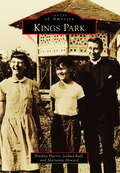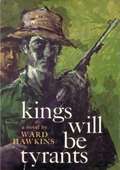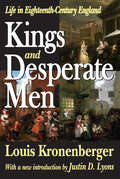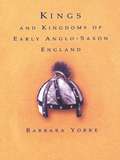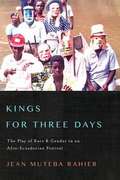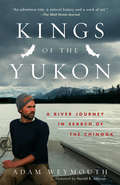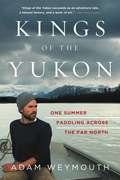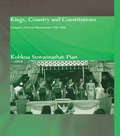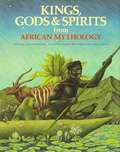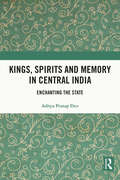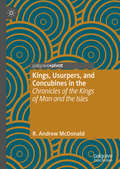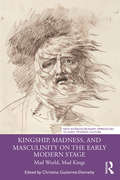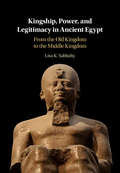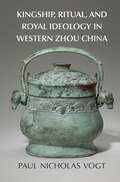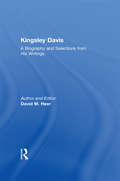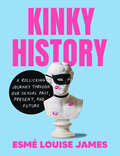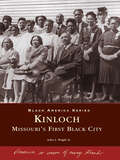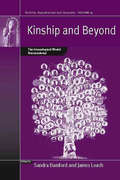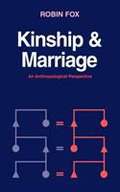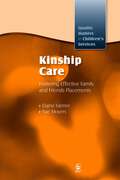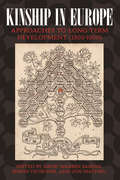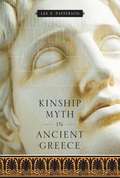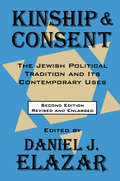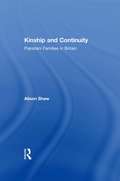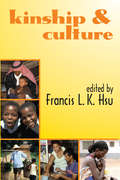- Table View
- List View
Kings Park (Images of America)
by Bradley Harris Joshua Ruff Marianne HowardNestled amidst a major commuter train line, a state highway, and picture-perfect views of the Long Island Sound and Nissequogue River, Kings Park balances its small-town feel with an excitingly diverse community vibrancy. Kings Park emerged in the late 19th century as the product of a utopian-inspired farm and the first state psychiatric hospital on Long Island. The community has diverse origins, with its foundation built upon thousands of incoming Irish and Italian immigrant workers and an orphanage for African American children. Throughout the 20th and early 21st centuries, Kings Park gradually evolved into a contemporary Long Island suburb, rebuilding after a traumatic downtown fire in 1917, reaping the benefits of one of the North Shore’s largest state parks (Sunken Meadow), and blossoming into a bustling family-oriented place.
Kings Will Be Tyrants
by Ward HawkinsKings Will Be Tyrants by Ward Hawkins is a 1959 novel about fighting in Cuba. Bernardo Manuel Patrick O'Brien is a former U.S. Marine who winds up fighting for Castro. Though a Marine, he has to deal with the conflict of his heritage, both Cuban and American.REBELS AND LOVERSThey sat side by side on the bank of the stream. In the moonlight, O’Brien could see the oval of her face, the brushed-back hair, the level hazel eyes and the soft mouth. He could see the swelling of her breasts in the open front of her shirt, the slender bare feet dangling in the water, and he could smell the many small odors that named her woman.She was very desirable. It was only in the matter of politics that they were on opposite sides. “I believe there is one matter in which we could agree,” he said softly.The girl met his searching look with a tentative smile.He reached out and put his big rough but oddly gentle hands on her shoulders and pushed her back until she was lying on the ground. She did not resist.But when he bent to put his mouth against hers, she whispered, “I have not done this before.”O’Brien tightened his arms around her. “Then it is time,” he said.Not since Hemingway’s FOR WHOM THE BELL TOLLS has there been such a gripping novel of love and war… “Dramatic, entertaining, highly readable…”—Los Angeles Times
Kings and Desperate Men: Life in Eighteenth-century England
by Louis KronenbergerThe goal of Kings and Desperate Men is to provide a picture of eighteenth-century England up to the French Revolution. Kronenberger's work lies much closer to a social chronicle than an orthodox history, and is more concerned with manners and tastes than with treaties and wars. Kings and Desperate Men reveals what life was like for both aristocrats and commoners: their family lives, experience of larger society, habits, diet, fashions, religion, and artistic tastes. In tracing these topics for both city and country dwellers, he artfully communicates the very real division between the vivacity of London and the regular, fixed, and monotonous character of country life. The division is vital to understanding the age and the transformations it would experience.Yet Kronenberger does not ignore the more traditional historical landmarks. Kroenberger treats the characters of the leading political actors: Walpole, Bolingbroke, Burke, Fox, and Pitt, while providing the reader with a sweeping account of the formation of political parties and constitutional shifts of power between the monarchy and parliament. Students of the period who despair at its political complexities will fi nd much to appreciate in Kronenberger's condensed and easy to understand formulations.As for philosophy, Kronenberger refers to thinkers and ideas as they influence English life; especially Locke and Hume. Their ideas and reputations are explained as part of the character of society. The same is true for economics. More attention is given to the social gains of middle-class shopkeepers and the eighteenth-century zeal for stock speculation than to formal schools of thought. Especially notable is Kronenberger's treatment of both the arts and the artists of the eighteenth century-theatre, opera, music, literature, architecture, and painting.
Kings and Kingdoms of Early Anglo-Saxon England
by Dr Barbara YorkeKings and Kingdoms of Early Anglo-Saxon England provides a unique survey of the six major Anglo-Saxon kingdoms - Kent, the East Saxons, the East Angles, Northumbria, Mercia and Wessex - and their royal families, examining the most recent research in this field.Barbara Yorke moves beyond narrative accounts of the various royal houses to explain issues such as the strategies of rule, the reasons for success and failure and the dynamics of change in the office of king. Sixteen genealogical and regnal tables help to elucidate the history of the royal houses.
Kings for Three Days: The Play of Race and Gender in an Afro-Ecuadorian Festival
by Jean Muteba RahierWith its rich mix of cultures, European influences, colonial tensions, and migration from bordering nations, Ecuador has long drawn the interest of ethnographers, historians, and political scientists. In this book, Jean Muteba Rahier delivers a highly detailed, thought-provoking examination of the racial, sexual, and social complexities of Afro-Ecuadorian culture, as revealed through the annual Festival of the Kings. During the Festival, the people of various villages and towns of Esmeraldas--Ecuador's province most associated with blackness--engage in celebratory and parodic portrayals, often donning masks, cross-dressing, and disguising themselves as blacks, indigenous people, and whites, in an obvious critique of local, provincial, and national white, white-mestizo, and light-mulatto elites. Rahier shows that this festival, as performed in different locations, reveals each time a specific location's perspective on the larger struggles over identity, class, and gender relations in the racial-spacial order of Esmeraldas, and of the Ecuadorian nation in general.
Kings of the Yukon: A River Journey in Search of the Chinook
by Adam Weymouth Harold R. JohnsonA stunning new voice in nature writing makes an epic journey along the Yukon River to give us the stories of its people and its protagonist--the king salmon, or the Chinook--and the deepening threat to a singular way of life, in a lyrical, evocative and captivating narrative.The Yukon River is 3,190 kilometres long, flowing northwest from British Columbia through the Yukon Territory and Alaska to the Bering Sea. Every summer, millions of salmon migrate the distance of this river to their spawning ground, where they go to breed and then die. The Chinook is the most highly prized among the five species of Pacific salmon for its large size and rich, healthy oils. It has long since formed the lifeblood of the economy and culture along the Yukon--there are few communities that have been so reliant on a single source. Now, as the region contends with the effects of a globalized economy, climate change, fishing quotas and the general drift towards urban life, the health and numbers of the Chinook are in question, as is the fate of the communities that depend on them. Travelling in a canoe along the Yukon River with the migrating salmon, a three-month journey through untrammeled wilderness, Adam Weymouth traces the profound interconnectedness of the people and the Chinook through searing portraits of the individuals he encounters. He offers a powerful, nuanced glimpse into the erosion of indigenous culture, and into our ever-complicated relationship with the natural world. Weaving in the history of the salmon run and their mysterious life cycle, Kings of the Yukon is extraordinary adventure and nature writing and social history at its most compelling.
Kings of the Yukon: One Summer Paddling Across the Far North
by Adam Weymouth"Stirring and heartbreaking." - David Owen, author of Where the Water GoesOne man's thrilling and transporting journey by canoe across Alaska in search of the king salmonThe Yukon river is 2,000 miles long, the longest stretch of free-flowing river in the United States. In this riveting examination of one of the last wild places on earth, Adam Weymouth canoes along the river's length, from Canada's Yukon Territory, through Alaska, to the Bering Sea. The result is a book that shows how even the most remote wilderness is affected by the same forces reshaping the rest of the planet. Every summer, hundreds of thousands of king salmon migrate the distance of the Yukon to their spawning grounds, where they breed and die, in what is the longest salmon run in the world. For the communities that live along the river, salmon was once the lifeblood of the economy and local culture. But climate change and a globalized economy have fundamentally altered the balance between man and nature; the health and numbers of king salmon are in question, as is the fate of the communities that depend on them. Traveling along the Yukon as the salmon migrate, a four-month journey through untrammeled landscape, Adam Weymouth traces the fundamental interconnectedness of people and fish through searing and unforgettable portraits of the individuals he encounters. He offers a powerful, nuanced glimpse into indigenous cultures, and into our ever-complicated relationship with the natural world. Weaving in the rich history of salmon across time as well as the science behind their mysterious life cycle, Kings of the Yukon is extraordinary adventure and nature writing at its most urgent and poetic.
Kings, Country and Constitutions: Thailand's Political Development 1932-2000
by Kobkua Suwannathat-PianProvides a detailed analysis of Thailand's political development since 1932, when Thailand became a constitutional monarchy, until the present. It examines the large number of different versions of the constitution which Thailand has had since 1932, and explains why the constitution has been subject to such frequent change, and why there have been so many outbursts of violent, political unrest. It explores the role of the military, and, most importantly, discusses the role of the monarchy, which, as the author shows, has been crucial in holding Thailand together through the various changes of regime. The author brings to light original and largely unseen documents from the Public Records Office and US National Archives, as well as drawing upon her extensive knowledge of politics in Thailand.
Kings, Gods And Spirits From African Mythology (The World Mythology Series)
by Jan KnappertFrom the Book Jacket: This book tells the myths and legends of the peoples of Africa. Africa is a vast continent and its landscape enormously varied, ranging from the great Sahara Desert to dense primeval forest, from snow-capped mountains to the plains of the savannah. The stories in this book have been passed down for generations and are still told and retold today. They include tales of gods, spirits and ghosts; sagas about famous heroes, warriors and royal leaders; and fables about the animals which play such an important part in the everyday life of the countryside. Twelve large color paintings, a full color map and many line drawings illustrate these fascinating tales. "This is an admirable series. The prose is readable, the myths retain their integrity and the illustrations are attractive and contribute to authenticity." - School Library Journal
Kings, Spirits and Memory in Central India: Enchanting the State
by Aditya Pratap DeoPart anthropological history and part memoir, this book is a unique study of the polity of the colonial-princely state of Kanker in central India. The author, a scion of the erstwhile ruling family of Kanker, delves into the oral accounts given in the ancestral deity practices of the mixed tribe-caste communities of the region to highlight popular narratives of its historical polity. As he struggles with his own dilemmas as ethnographer-king, what comes into view is a polity where the princely state is drawn out amidst a terrain of gods and spirits as much as that of law courts and magistrates, and political power is divided, contested and shared between the raja/state and the people. This study constitutes not only an intervention in the larger debate on the relationship between state formations and tribal peoples, but also on the very nature of history as a knowledge practice, especially the understandings of power, authority and sovereignty in it. Combining intensive ethnography, complementary archival work and crucial theoretical questions engaging social scientists worldwide, the author charts an unusual explanatory path that can allow us to meaningfully understand societies/peoples that have historically been marginalized and seen as different. This book will be of interest to students and researchers of history, anthropology, politics, religion, tribal society and Modern South Asia.
Kings, Usurpers, and Concubines in the 'Chronicles of the Kings of Man and the Isles'
by R. Andrew McDonaldThis Palgrave Pivot explores the representation of sea kings, sinners, and saints in the mid-thirteenth century Chronicles of the Kings of Man and the Isles, the single most important text for the history of the kingdoms of Man and the Isles, c.1066-1300. The focus of the Chronicles on the power struggles, plots and intrigues within the ruling dynasties of Man and the Isles offers an impressive array of heroes and villains. The depiction of the activities of heroic sea kings like Godred Crovan, tyrannical usurpers like Harald son of Godred Don, and their concubines and wives, as well as local heroes like Saint Maughold, raises important questions concerning the dynamic interactions of power, gender and historical writing in the medieval Kingdoms of Man and the Isles, and provide new insights into the significance of the text that is our most important source of information on these ‘Forgotten Kingdoms’ of the medieval British Isles.
Kingship, Madness, and Masculinity on the Early Modern Stage: Mad World, Mad Kings (New Interdisciplinary Approaches to Early Modern Culture)
by Christina Gutierrez-DennehyKingship, Madness, and Masculinity examines representations of mad kings in early modern English theatrical texts and performance practices. Although there have been numerous volumes examining the medical and social dimensions of mental illness in the early modern period, and a few that have examined stage representations of such conditions, this volume is unique in its focus on the relationships between madness, kingship, and the anxiety of lost or fragile masculinity. The chapters uncover how, as the early modern understanding of mental illness refocused on human, rather than supernatural, causes, public stages became important arenas for playwrights, actors, and audiences to explore expressions of madness and to practice diagnoses. Throughout the volume, the authors engage with the field of disability studies to show how disability and mental health were portrayed on stage and what those representations reveal about the period and the people who lived in it. Altogether, the essays question what happens when theatrical expressions of madness are mapped onto the bodies of actors playing kings, and how the threat of diminished masculinity affects representations of power. This volume is the ideal resource for students and scholars interested in the history of kingship, gender, and politics in early modern drama.
Kingship, Power, and Legitimacy in Ancient Egypt: From the Old Kingdom to the Middle Kingdom
by Lisa K. SabbahyIn this book, Lisa Sabbahy presents a history of ancient Egyptian kingship in the Old Kingdom and its re-formation in the early Middle Kingdom. Beginning with an account of Egypt's history before the Old Kingdom, she examines the basis of kingship and its legitimacy. The heart of her study is an exploration of the king's constant emphasis on his relationship to his divine parents, the sun god Ra and his mother, the goddess Hathor, who were two of the most important deities backing the rule of a divine king. Sabbahy focuses on the cardinal importance of this relationship, which is reflected in the king's monuments, particularly his pyramid complexes, several of which are analysed in detail. Sabbahy also offers new insights into the role of queens in the early history of Egypt, notably sibling royal marriages, harem conspiracies, and the possible connotations of royal female titles.
Kingship, Ritual, and Royal Ideology in Western Zhou China
by Paul Nicholas VogtIn accounts of Chinese history, the Western Zhou period has been lionized as a golden age of ritual, when kings created the ceremonies that underlay the traditions of imperial governance. In this book, Paul Nicholas Vogt rediscovers their roots in the vagaries of Western Zhou royal geopolitics through an investigation of inscriptions on bronze vessels, the best contemporary source for this period. He shows how the kings of the Western Zhou adapted ritual to create and retain power, while introducing changes that affected later remembrances of Zhou royal ritual and that shaped the tradition of statecraft throughout Chinese history. Using ritual and social theory to explain Western Zhou history, Vogt traces how the traditions of pre-modern China were born, how a ruling dynasty establishes and holds on to power, how religion and politics can support and restrain each other, and how ancient peoples made, used, and assigned meaning to art and artifacts.
Kingsley Davis: A Biography and Selections from His Writings
by David M. Heer"Kingsley Davis (1908-1997) was one of the pioneers in social demography, and was particularly identified with the theory of the demographic transition. This holds that the process of industrialization first causes mortality to decline, leading to a substantial rate of population growth and only later causes fertility to fall, leading eventually to the cessation of population growth. Kingsley Davis is especially remembered for his arresting and forceful critique of family-planning programs intended to achieve zero population growth.Before he devoted his major attention to social demography, Davis had distinguished himself through influential articles on the structure of family and kinship, including the topics of jealousy and sexual property, the sociology of prostitution, and illegitimacy. He had an early interest in structural-functional analysis, which resulted in his famous and controversial article on stratification, co-authored with Wilbert Moore, and his equally famous presidential address to the American Sociological Association in 1959.David Heer's biography of Kingsley Davis is based on material contained in the Kingsley Davis Archive at the Hoover Institution Library at Stanford University, the Kingsley Davis graduate file at Harvard University, the interview of Kingsley Davis by Jean van der Tak in Demographic Destinies (1990), and David Heer's personal relationship with Kingsley Davis. The book also contains thirty of the most important writings by Kingsley Davis. These were chosen, in part, for the number of citations received in the Cumulative Social Science Citation Index, and in part to ensure that readers would be able to assess the continuity of Kingsley Davis's ideas at all stages of his career."
Kinky History: A Rollicking Journey through Our Sexual Past, Present, and Future
by Esmé Louise JamesA provocative journey through human sexual history, packed with fun factoids and forgotten stories, from the historian and storyteller behind Kinky History, @esme.louisee on TikTokContrary to popular belief, our predecessors had all sorts of obscene hobbies long before Christian Grey hit the scene. In this enlightening romp, learn about the first instances of homosexuality on record from the ancient world and the diverse history of nonbinary gender; encounter a thousand years&’ worth of hilarious and horrifying contraceptive methods; consider the positive and negative effects of the widespread availability of pornography in the digital age—and how our relationship to it changed during the pandemic; take a sneaky riffle through centuries of bedside drawers; and discover the dirty little secrets of luminaries such as Julius Caesar, James Joyce, Albert Einstein, and Virginia Woolf. Esmé Louise James also identifies the key tipping points that directly inform current beliefs around sex to place the past in conversation with the present. By educating ourselves about the weird, wonderful, and varied spectrum of human sexuality and experience, we can normalize and destigmatize sex, write people of marginalized sexual identities back into the pages of history, and build toward a more liberated future.
Kinloch: Missouri's First Black City (Black America Series)
by John A. Wright Sr.Located just outside of St. Louis, Kinloch was once a community locked off from the rest of the area by natural and man-made barriers. In spite of a lack of financial resources, it once provided its residents with a school district, city hall, post office, business district, and recreational facilities. Residents will recognize Dunbar Elementary, the oldest school for blacks in St. Louis County, Holy Angels, the oldest continuing black parish in the St. Louis Archdiocese, as well as former residents Congresswoman Maxine Waters and political activist Dick Gregory. Eventually, due to insufficient revenue, this once thriving community fell into decline, and is now struggling to keep its small town values and ideals alive.
Kinship And Beyond
by Sandra Bamford James LeachThe genealogical model has a long-standing history in Western thought. The contributors to this volume consider the ways in which assumptions about the genealogical model--in particular, ideas concerning sequence, essence, and transmission--structure other modes of practice and knowledge-making in domains well beyond what is normally labeled "kinship." The detailed ethnographic work and analysis included in this text explores how these assumptions have been built into our understandings of race, personhood, ethnicity, property relations, and the relationship between human beings and non-human species. The authors explore the influences of the genealogical model of kinship in wider social theory and examine anthropology's ability to provide a unique framework capable of bridging the "social" and "natural" sciences. In doing so, this volume brings fresh new perspectives to bear on contemporary theories concerning biotechnology and its effect upon social life.
Kinship And Marriage: An Anthropological Perspective (Cambridge Studies In Social And Cultural Anthropology #50)
by Robin FoxRobin Fox's study of systems of kinship and alliance has become an established classic of the social science literature. It has been praised above all for its liveliness of style and clarity of exposition in an area that students and general readers have found difficult to master. It was the first attempt to produce an overview of this central subject and has maintained its unique position over the years. Fox's reconciliation of 'descent' and 'alliance' theories, and his 'deductive' approach to the logic of kinship systems based on four universal premises, give the book its distinctive flavour and make it not only the best available introductory text but a contribution to theory in its own right. It has been used throughout the world as an introduction for both academic and lay readers and has been translated into numerous languages.
Kinship Care: Fostering Effective Family and Friends Placements
by Elaine Farmer Sue MoyersChildren are frequently cared for by relatives and friends when parents, for whatever reason, are unable to care for their children themselves. Yet there has been very little information about how well children do when placed with kin or how safe they are in these placements. This book compares formal kinship care to traditional foster placements in order to ascertain which children are placed with kin, in what circumstances, how well such children progress, and how often these placements disrupt. The authors explore whether children placed with family and friends fare better or worse than other foster children, what services are provided and needed, and how kin care is experienced by carers, children and social workers. This book will be essential reading for social workers, policy makers, students and all those working with looked-after children, and will enable local authorities to make informed decisions about where best to place children and the support needed by family and friend carers.
Kinship In Europe
by David Warren Sabean Jon Mathieu Simon TeuscherSince the publication of Philippe Ariès's book, Centuries of Childhood, in the early 1960s, there has been great interest among historians in the history of the family and the household. A central aspect of the debate relates the story of the family to implicit notions of modernization, with the rise of the nuclear family in the West as part of its economic and political success. During the past decade, however, that synthesis has begun to break down. Historians have begun to examine kinship - the way individual families are connected to each other through marriage and descent - finding that during the most dynamic period in European industrial development, class formation, and state reorganization, Europe became a "kinship hot" society. The essays in this volume explore two major transitions in kinship patterns - at the end of the Middle Ages and at the end of the eighteenth century - in an effort to reset the agenda in family history.
Kinship Myth in Ancient Greece
by Lee E. PattersonIn ancient Greece, interstate relations, such as in the formation of alliances, calls for assistance, exchanges of citizenship, and territorial conquest, were often grounded in mythical kinship. In these cases, the common ancestor was most often a legendary figure from whom both communities claimed descent. In this detailed study, Lee E. Patterson elevates the current state of research on kinship myth to a consideration of the role it plays in the construction of political and cultural identity. He draws examples both from the literary and epigraphical records and shows the fundamental difference between the two. He also expands his study into the question of Greek credulity--how much of these founding myths did they actually believe, and how much was just a useful fiction for diplomatic relations? Of central importance is the authority the Greeks gave to myth, whether to elaborate narratives or to a simple acknowledgment of an ancestor. Most Greeks could readily accept ties of interstate kinship even when local origin narratives could not be reconciled smoothly or when myths used to explain the link between communities were only "discovered" upon the actual occasion of diplomacy, because such claims had been given authority in the collective memory of the Greeks.
Kinship and Consent: Jewish Political Tradition and Its Contemporary Uses
by Daniel L. ElazarA major dimension of modern Jewish life has been the revival of conscious political activity on the part of the Jewish people, whether through reestablishment of the State of Israel, new forms of diaspora community organization, or the common Jewish fight against anti-Semitism. Precisely because contemporary Jewry has moved increasingly toward self
Kinship and Continuity: Pakistani Families in Britain
by Alison ShawKinship and Continuity is a vivid ethnographic account of the development of the Pakistani presence in Oxford, from after World War II to the present day. Alison Shaw addresses the dynamics of migration, patterns of residence and kinship, ideas about health and illness, and notions of political and religious authority, and discusses the transformations and continuities of the lives of British Pakistanis against the backdrop of rural Pakistan and local socio-economic changes. This is a fully updated, revised edition of the book first published in 1988.
Kinship and Culture
by Francis L. K. HsuAt one time Francis L.K. Hsu put forth a hypothesis on kinship that proposed a functional relationship between particular kinship systems and behavior patterns in particular cultural contexts. The controversy provoked among cultural anthropologists by this hypothesis is reflected in this book, which points the way toward more fruitful investigations of kinship in cultural and psychological anthropology.Hsu's hypothesis offers an alternative to the study of kinship as a mathematical game and to the treatment of fragmentary aspects of child-rearing practices as major causal factors in culture. Considering the kinship system as the psychological factory of culture, Hsu's aim is to discover the crucial forces in each system that shape the interpersonal orientation of the individual, which forms the individual's basis for adequate functioning as a member of his society and which, in turn, provides his culture with a basis for continuity and change. His central hypothesis is that the attributes of the dominant dyads in a given kinship system (such as father-son or mother-daughter) tend to determine the attitudes and action patterns that the individual in such a system develops toward other relationships in that system as well as toward his relationships outside of it.The topics are varied, ranging from the link between dyadic dominance and household maintenance, to role dilemmas and father-son dominance, to sex-role identity and dominant kinship relationships. The editor has contributed an introduction, an original essay on kinship and patterns of social cohesion, and a summary chapter to bring coherence to the diversity of opinion stated. This new presentation of Hsu's hypothesis, together with its discussion by eminent anthropologists and its recommendations for future research in the area, is an important addition to the literature on kinship.
